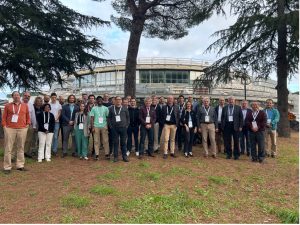
Two important international workshops took place in the Rome area in mid-November, focusing on the design of the future Future Circular Collider electron-positron collider (FCC-ee) at CERN.
The first workshop, “FCCIS Collider Design Workshop“, was held at the Angelicum congress centre in Rome, gathering accelerator physicists from some of the most prestigious laboratories in the world, including CERN, SLAC, BNL, DESY, KEK, and LNF, to discuss open design issues and present the progress of the project. The congress was the fourth event of the Horizon 2020 Future Circular Collider Innovation Study (FCCIS) funded by the European project. The agenda for the workshop is available at this link.
The discussions aligned with the timing of the overall FCC project evaluation, which included a mid-term review conducted by an international committee of experts to assess the progress and cost estimates. These workshops laid the foundation for the planning of the next two years of the study, which will be crucial for the CERN’s final approval of FCC.
The great interest from Italian physicists and the support of INFN (Italian National Institute for Nuclear Physics) for FCC were expressed by Pierluigi Campana, member of the INFN Executive Board, and Roberto Tenchini, the President of the National Scientific Commission 1. Campana outlined INFN’s funding plans for research and development projects, including two related to FCC-ee: one on the mockup of the interaction region and another on superconducting radiofrequency cavities. Tenchini highlighted the strong interest from the Italian experimental community in FCC-ee, which will enable precision measurements of the Higgs boson, the Z boson, and ttbar processes. He also mentioned the potential utilization of the 100 km tunnel infrastructure for an hadronic machine capable of reaching up to 100 TeV center-of-mass energy.
The second workshop, “FCC-ee MDI & IR Mockup Workshop“, took place at the Frascati National Laboratory, November 16 and 17. This event focused on the discussion of the design of the interaction region (IR) of FCC-ee, addressing topics such as the superconducting magnet system within the detector and the design of its cryostat, integration with the detector (particularly the vertex detector), and background studies. The workshop also discussed the objectives and status of the R&D project for a 1:1 prototype of the IR, co-financed by CERN and INFN. The workshop’s agenda can be found at this link.
The scientific discussions, characterized by collaborative spirit, identified innovative solutions for the optimal interaction region for the next lepton machine to be built in Europe. In his opening speech, Frank Zimmermann emphasized the importance of the laboratory in the birth of e+e- colliders and expressed his hope that DAFNE, a flagship facility of LNF, could become an “Open Accelerator Test Facility.”
Both events were organized by Manuela Boscolo from LNF, the scientific leader for INFN in the FCCIS project, and Frank Zimmermann, the deputy study leader from CERN. The support of INFN-Roma1’s secretariat was essential for the event at the Angelicum, and the accelerator division’s secretariat played an important role in the event at LNF.
 INFN-LNF Laboratori Nazionali di Frascati
INFN-LNF Laboratori Nazionali di Frascati